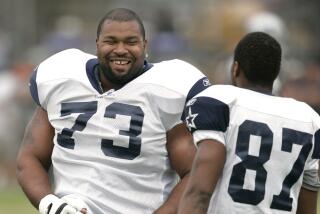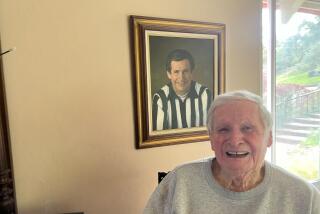Conundrum for Cowboys : Dallas Tried to Change Image, but It Lasted Only Two Weeks
After last season, Jerry Jones did everything he could to ensure no more Dallas Cowboys would get in trouble with the law.
He didn’t count on his coach.
After three weeks of training camp, the jokes about America’s (Most Wanted) Team began again. First it was coach Barry Switzer, who was caught at the Dallas airport going through security with a loaded .38 pistol, then it was players trashing a dorm at St. Edward’s University as camp ended.
What it proved was that Cowboys will be Cowboys--a team that can’t shake its reputation for bad behavior no matter what the players say. In fact, even some of its oldest and wisest players don’t seem to see much wrong.
“A lot of men and a lot of testosterone is running around,” said 35-year-old guard Nate Newton, himself the subject of rape allegations by a woman with whom he had a relationship. “Shirts off, feeling good, beating your chest. They’ve been cooped up for the last five weeks. Man against material, that’s all it is. Just having fun.”
The sideshows reached a peak last season, when the Cowboys fell to 10-6 after winning their third Super Bowl in four years and lost in the playoffs to Carolina. This year, they seem dedicated--they can tie Pittsburgh’s mark of four Super Bowl titles in six seasons and jump ahead of San Francisco with six overall.
The major reason for the dedication is quarterback Troy Aikman, who maintains that the team’s attitude has changed. Its image is another issue.
“Nationally, what this thing does is give credence to the perception that is already out there,” Aikman acknowledged after the players trashed the dorm. “That’s what is unfortunate. It gives us a black eye and sets us back further.”
Still, it doesn’t undo the quarterback’s impact on the 1997 Cowboys.
It was Aikman who spent the offseason making sure key free agents were re-signed. It was Aikman who certified the team’s No. 1 draft pick.
And it was Aikman who made it clear that he wanted out unless there was an end to the impression that drugs, drinking and women often transcended football.
“You could argue that this is Troy’s team, although I still have the ultimate call on everything “ says team owner Jones.
“But he’s only the most vocal of the players who wanted it all to end. You could say it was Daryl Johnston’s team and Emmit Smith’s and Tony Tolbert’s and Chad Hennings’ and Darren Woodson’s too. None of them were happy about what was going on.”
What WAS going on is why what’s going on now looms so large.
In the 1995 and 1996 seasons, five players were suspended for violations of the NFL’s substance abuse policy--Leon Lett twice (he’s serving a year’s suspension that won’t end until late November).
Michael Irvin, the star wide receiver, pleaded no contest to cocaine charges, getting off with probation and public service.
Then, the Dallas police said they were investigating claims that a woman was sexually assaulted by Irvin and offensive tackle Erik Williams. The claims proved unfounded and Irvin and Williams subsequently received more than $2 million from the TV station that first aired the story in an out-of-court settlement.
But that didn’t assuage Aikman’s concerns.
“We brought it all on ourselves,” he said. “We acted like we were being victimized, but we weren’t. Last year we were an organization that thought it was pretty damn good--so good it could just show up and win the game. This place was like a three-ring circus.”
Aikman considered quitting after last season--more likely he might have demanded a trade. Instead, he made sure the Cowboys signed their key free agents--notably fullback Daryl “Moose” Johnston, his good friend and fellow critic of the atmosphere around the team headquarters at Valley Ranch in Irving.
Then, before the April draft, he worked out wide receivers Ike Hilliard and Reidel Anthony of Florida, tight ends Tony Gonzalez of Cal and David LaFleur of LSU. The first three were gone when Dallas drafted, but Aikman strongly urged the Cowboys to get LaFleur and they traded up to draft him.
Jones also spent the offseason polishing his team’s image.
He made much of hiring Calvin Hill, the former Cowboys’ running back as a consultant and player adviser. Hill’s son Grant is a star on the Detroit Pistons and his behavior and demeanor are often cited as examples for young athletes.
But Calvin Hill is more an adornment.
What was real was the training camp, although one of the steps may have backfired.
Hidden away at the dorms at St. Edwards were security cameras, monitored by guards who knew who left after curfew. During the last-day trashing, the cameras were among the items trashed.
Switzer also was different.
The man whose laid-back coaching style was one of Aikman’s targets, ran drills with linebackers and halted practice one day to scream at his team, even pushing Williams, the right offensive tackle, who outweighs Switzer by at least 125 pounds.
Irvin, whose problems with the law and the league made him hostile and reclusive last season, was more outgoing, even relaxing on a golf cart after practice, giving reporters 10 minutes of his time.
Most important seemed to be attitude.
“If we were 10-6 and had played our best I’d have no complaints,” Aikman said. “But nobody played up to his ability and that includes me. We have far too much talent to play the way we did last season.”
Smith, with Aikman and Irvin the offensive “triplets” who make the Cowboys so dangerous, is also angry at the perception that he and the Cowboys have seen better days.
Smith had a decent season in 1996--for an average running back. But his 1,204 yards were the fewest he had gained since his rookie season in 1990 and his 3.7 average per carry was the lowest of his career and a full yard lower than his average in 1995, leading to speculation that he had “hit the wall,” declining as the hits increased.
But the real reason was his right ankle, operated on after the season for floating bone chips.”Who could play on a broken ankle?” he asked
“Nobody knows what went on here last year. Heck, the pressure’s off. Green Bay won the Super Bowl. Let them get some of the heat.”
That may be wishful thinking--Dallas is, and always has been, “America’s Team”--to love and to hate.
It was marketed that way by Tex Schramm in the ‘60s and ‘70s, when Jones was an oil wildcatter in Arkansas and it was more so during the 3-13 and 1-15 seasons in 1989 and 1990, between which the team passed from Schramm and Tom Landry to Jones and Jimmy Johnson.
But Switzer’s problems in Dallas have gone beyond that.
Even with a Super Bowl victory and three NFC East titles in three years, he has been perceived as the man portrayed in a headline as “Bozo the Coach” following a controversial fourth-down decision in Philadelphia two years ago. His arrest on the gun charge only seemed to confirm that and demonstrated how quickly things can turn.
His players stood behind him then, even Aikman--the quarterback, coach, owner, general manager and disciplinarian.
“Believe it or not,” he said during camp. “This team is made up of a lot of good people.”
After the dorms were trashed, he added: “I think I might have a hard time making that argument right now.”
Yes, it’s a hard sell.
More to Read
Go beyond the scoreboard
Get the latest on L.A.'s teams in the daily Sports Report newsletter.
You may occasionally receive promotional content from the Los Angeles Times.










